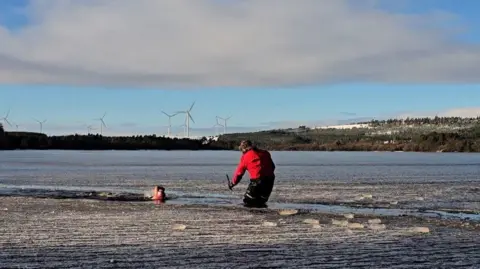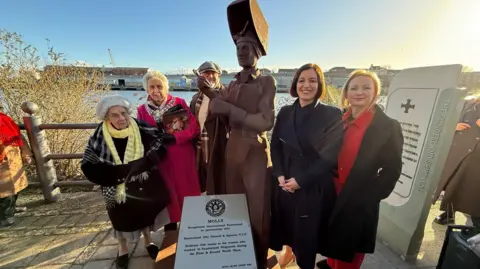Wearside stories you may have missed
 BBC
BBCThe arrival of electric buses, a teenager taking a crack at the World Ice Swimming Championships, and an "insanely exciting" star discovery.
Here are some stories you may have missed on Wearside this week.
Passengers board Sunderland's electric buses

Passengers have returned to electric-powered travel after 70 years with the arrival of a city's fleet of battery-operated buses.
A total of 20 single-decker vehicles are entering service at Stagecoach North East's Sunderland depot.
The new buses will run on the E1, E2 and E6 routes between Wearside and South Shields, replacing older and less environmentally-friendly vehicles.
Passenger Terry Amess, from South Shields, said the journey "felt smooth" and the seats were comfortable.
Scientists make 'insanely exciting' star discovery
 NASA, ESA, and J. Lotz and the HFF Team
NASA, ESA, and J. Lotz and the HFF TeamScientists have discovered 44 previously unknown stars which had been hidden behind a cluster of galaxies.
Physicists at Durham University helped discover the stars in the Dragon Arc galaxy nearly 6.5 billion light-years from Earth as part of an international research project.
Pictures show how the stars look during a period known as the cosmic noon - the middle ages of the universe when the most stars were born.
The Durham team was led by physicists David Lagattuta and Mathilde Jauzac, who said discovering the stars was "insanely exciting".
Teen takes on World Ice Swimming Championships

A Sunderland schoolgirl is preparing to throw herself into icy depths as the youngest ever member of Great Britain's ice swimming team.
Frankie Jackson, who turned 14 last month, has been selected as one of 49 swimmers to travel to Molveno, Italy, this weekend and represent their country in the world championships.
She has been training at one of England's coldest open water venues, Sweethope Lough in Northumberland.
Faced with the prospect of plunging into icy water, she said: "I just sort of get on with it really."
Sculpture honours 'forgotten' women shipworkers

A sculpture honouring the "forgotten" women shipyard workers of Wearside has been unveiled.
The 6ft (1.8m) tall corten steel artwork, named Molly, recognises those who kept the Sunderland shipyards running while men fought in World War Two.
Education Secretary and minister for women Bridget Phillipson cut the ribbon to reveal the statue, which has been installed on the riverside opposite the National Glass Centre.
Catherine Jamieson, 95, said women like her had "kept the yards going" and said the sculpture would help a new generation understand their efforts.
